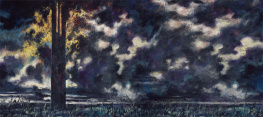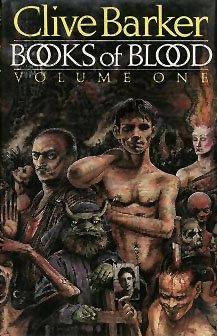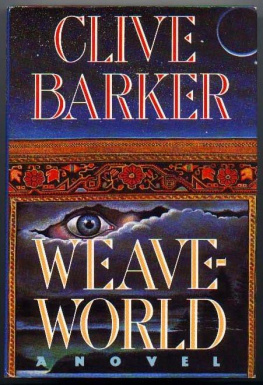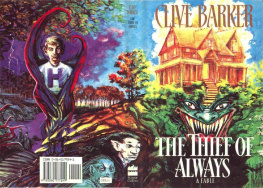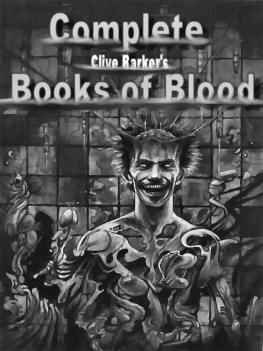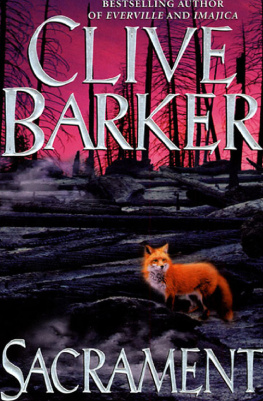Clive Barker - Everville
Here you can read online Clive Barker - Everville full text of the book (entire story) in english for free. Download pdf and epub, get meaning, cover and reviews about this ebook. genre: Science fiction. Description of the work, (preface) as well as reviews are available. Best literature library LitArk.com created for fans of good reading and offers a wide selection of genres:
Romance novel
Science fiction
Adventure
Detective
Science
History
Home and family
Prose
Art
Politics
Computer
Non-fiction
Religion
Business
Children
Humor
Choose a favorite category and find really read worthwhile books. Enjoy immersion in the world of imagination, feel the emotions of the characters or learn something new for yourself, make an fascinating discovery.

- Book:Everville
- Author:
- Genre:
- Rating:5 / 5
- Favourites:Add to favourites
- Your mark:
- 100
- 1
- 2
- 3
- 4
- 5
Everville: summary, description and annotation
We offer to read an annotation, description, summary or preface (depends on what the author of the book "Everville" wrote himself). If you haven't found the necessary information about the book — write in the comments, we will try to find it.
Everville — read online for free the complete book (whole text) full work
Below is the text of the book, divided by pages. System saving the place of the last page read, allows you to conveniently read the book "Everville" online for free, without having to search again every time where you left off. Put a bookmark, and you can go to the page where you finished reading at any time.
Font size:
Interval:
Bookmark:
Clive Barker
Everville
Memory, prophecy and fantasy the past, the future and the dreaming moment between are all in one country, living one immortal day.
to know that is Wisdom. to use it is the Art.
PART ONE was is AND WILL BE
It was hope undid them. Hope, and the city that Providence had made them suffer enough for their dreams. They'd lost so much already along the-children, healers, leaders, all taken-surely, they reasoned, God would preserve them from further loss, and reward their griefs and hardships with deliverance into a place of plenty.
When the first signs of the blizzard had appeared clouds that had dwarfed the thunderheads of Wyoming rising behind the peaks ahead, slivers of ice in the wind-they had said to each other. This is the final test. If we turn back now, intimidated by cloud and ice, then all those we buried along the way will have died for nothing; their suffering and ours will have been for nothing. We must go on. Now more than ever we must have faith in the dream of the West. After all, they told each other, it's only the first week of October. Maybe we'll see a flurry or two as we climb, but by the time the winter sets in we'll be over the mountains and down the other side, in the midst of sweet meadows. On then; on, for the sake of the dream.
Now it was too late to turn back. Even if the snows that had descended in the last week had not sealed the pass behind the pioneers, the horses were too malnourished and too weakened by the climb to haul the wagons back through the mountains. The travelers had no choice but to go forward, ugh they had long since lost any sense of their whereabouts and were journeying blind in a whiteness as utter as y black midnight.
Sometimes the wind would shred the clouds for a moment, but there was no sign of sky or sun. Only another pitiless peak rising between them and the promised land, snow driven from its summit in a slow plume, then drooping, and descending upon the slopes where they would have to venture if they were to survive.
Hope was small now; and smaller by the day. Of the eighty-three optimistic souls who had departed Independence, Missouri, in the spring of 1848 (this sum swelled by six births along the way), thirty-one remained alive. During the first three months of the journey, through Kansas, into Nebraska, then across 487 miles of Wyoming, there had been only six fatalities. Three lost in a drowning accident; two wandered off and believed killed by Indians; one hanged by her own hand from a tree. But with the heat of summer, sicknesses abounded, and the trials of the journey began to take their toll. The very young and the very old had perished first, sickened by bad water or bad meat. Men and women who had been in the prime of their lives five or six months before, hardy, brave, and ripe, became withered and wretched as the food stocks dwindled, and the land, which they had been told would supply them with all manner of game and fruit, failed to provide the promised bounty. Men would leave the wagon train for days at a time in search of food, only to return hollow eyed and empty-handed. It was therefore in an already much weakened state that the travelers faced the cold, and its effect had proved calamitous. Forty-seven individuals had perished in the space of three weeks, dispatched by frost, snow, exhaustion, starvation, and hopelessness.
It had fallen to Herman Deale, who was the closest the survivors had to a physician since the death of Doc Hodder, to keep an account of these deaths. When they reached Oregon, the glad land in the West, he had told the survivors they would together pray for the departed, and pay due respects to each and every soul whose passing he had set down in his journal. Until that happy time, the living were not to concern themselves overmuch with the dead. they had gone into the warmth and comfort of God's Bosom and would not blame those who buried them for the shallowness of their graves, or the brevity of the prayers said over them.
"We will speak of them lovingly," Deale had declared, "when we have a little breath to spare."
The day after making this promise to the deceased, he had joined their number, his body giving out as they ploughed through a snow field. His corpse remained unburied, at least by human hand. The snow was coming down so thickly that by the time his few provisions had been divided up among the remaining travelers, his body had disappeared from sight.
That night, Evan Babcock and his wife, Alice, both perished in their sleep, and Mary Willcocks, who had outlived all five of her children, and seen her husband wither and die from grief, succumbed with a sob that was still ringing off the mountain-face after the tired heart that had issued it was stilled.
Daylight came, but it brought no solace. The snowfall was as heavy as ever. Nor was there now a single crack in the clouds to show the pioneers what lay ahead. they went with heads bowed, too weary to speak, much less sing, as they had sung in the blithe months of May and June, raising hosannas to the heavens for the glory of this adventure.
A few of them prayed in silence, asking God for the strength to survive. And some, perhaps, made promises in their prayers, that if they were granted that strength, and came through this white wilderness to a green place, their gratitude would be unbounded, and they would testify to the end of their lives that for all the sorrows of this life, no man should turn from God, for God was hope, and Everlasting.
At the beginning of the journey west there had been a total of thirty-two children in the caravan. Now there was only one. Her name was Maeve O'Connell; a plain twelve-year-old whose thin body belied a fortitude which would have astonished those who'd shaken their heads in the spring and told her widowed father she would never survive the journey. She was stick and bones, they'd said, weak in the legs, weak in belly. Weak in the head too, most likely, they whispered and their hands, just like her father Harmon, who while parties had been assembling in Missouri, had talked most elaborately of his ambitions for the West. Oregon might well be Eden, he'd said, but it was not the forests and the mountains that would distinguish it as a place of human triumph: It was the glorious, shining city that he intended to build there.
Idiotic talk, it was privately opined, especially from an Irishman who'd seen only Dublin and the backstreets of Liverpool and Boston. What could he know of towers and palaces?
Once the journey was underway, those who scorned Hannon among themselves became a good deal less discreet, and he soon learned to keep talk of his ambitions as a founder of cities between himself and his daughter. His fellow travelers had more modest hopes for the land that lay ahead. A stand of timber from which to build a cabin; good earth; sweet water. they were suspicious of anyone with a grander vision.
Not that the modesty of their requirements had subsequently spared them from death. Many of the men and women who'd been most voluble in their contempt for Harmon were dead now, buried far from good earth or sweet water, while the crazy man and his stick and bones daughter lived on. Sometimes, even in these last desperate days, Maeve and Hannon would whisper as they walked together beside their skeletal nag. And if the wind shifted for a moment it would carry their words away to the ears of those nearby. Exhausted though they were, father and daughter were still talking of the city they would build when this travail was over and done; a wonder that would live long after every cabin in Oregon had rotted, and the memories of those who'd built them gone to dust.
they even had a name for this time-defying metropolis.
It would be called Everville.
Ah, Everville!
How many nights had Maeve listened to her father talk of the place, his eyes on the crackling fire, but his gaze on another sight entirely: the streets, the squares, and the noble houses of that miracle to be.
Font size:
Interval:
Bookmark:
Similar books «Everville»
Look at similar books to Everville. We have selected literature similar in name and meaning in the hope of providing readers with more options to find new, interesting, not yet read works.
Discussion, reviews of the book Everville and just readers' own opinions. Leave your comments, write what you think about the work, its meaning or the main characters. Specify what exactly you liked and what you didn't like, and why you think so.




